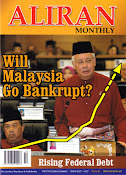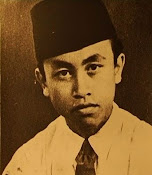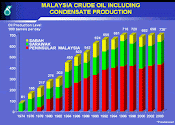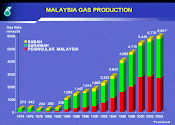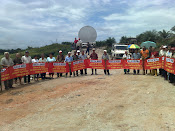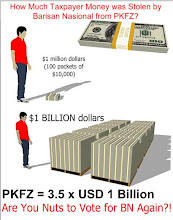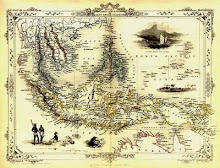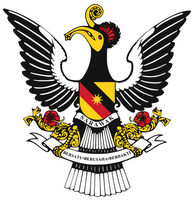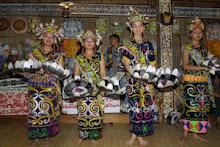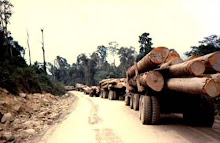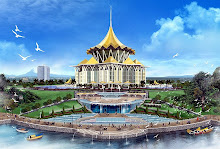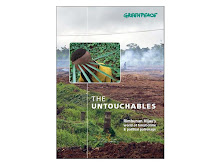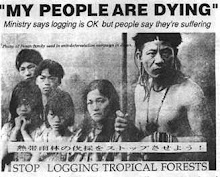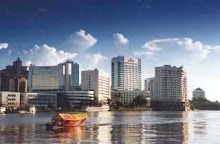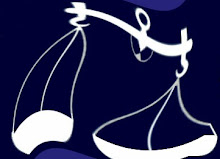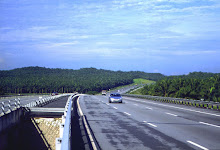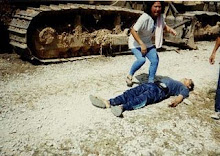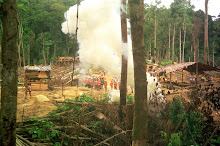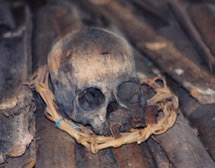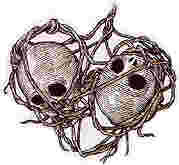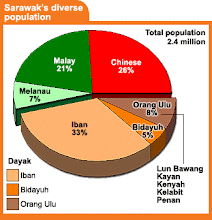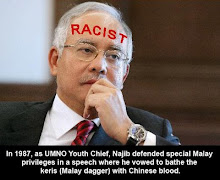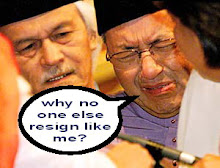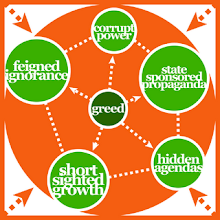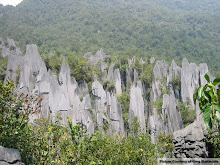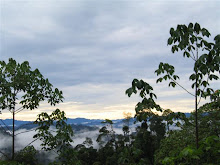Sunday, 02 May 2010 00:00
With comments by Sarawak Headhunter in red.
Is Mahathir a maverick, machiavellian in his ways or merely mainstream? That’s the question Maznah Mohamad poses in her review of Barry Wain’s book ‘Malaysian Maverick: Mahathir Mohamad in Turbulent Times'.
As far as Sarawak Headhunter is concerned, Mahathir, just like Taib Mahmud and those who support him, are just plain scheming evil maniacs.
My first reaction to the book was, how could this be any different from the several others already written of the man, for example, that of Khoo Boo Teik’s Paradoxes of Mahathirism and In-Won Hwang’s Personalised Politics (Not forgetting articles and commentaries generated by countless number of print and virtual writers before this)?
After going through the first few chapters of the book I knew that this was going to be different, more impactful and more of a fine strike at the core of the matter.
Mahathir has remained enigmatic and so far, seems to be unmoved by the tons of criticisms directed at him. Perhaps this was balanced by the loads of adulation and fawning by his coterie of loyalists, as exemplified by the quality of the commentators in his own blog (which could number up to a 1,000 comments for a single post, with most starting their address with Yang dikasihi Tun – The Most Beloved Tun).
This is the epitome of evil - to remain unmoved and unrepentant in the face of all criticism. Enigmatic? Far from it, just plain downright evil. Even Satan would be put to shame.
In gossip circles, Mahathir is known to have the thickest skin on the planet and is impervious to any verbal assaults on his character and his ways. People are astounded by his ability to trounce all of his rivals and those he simply could not tolerate even when he is out of power.
Even the thickest skin on the planet cannot disguise the true evil nature of this man. Are we to be astounded by his purported "ability" or to be thoroughly repulsed and disgusted by it?
Mahathir is perhaps the only person in the world who could evoke sympathy on this by proclaiming that he was wronged by the wrong people he had chosen to be under him, from Musa Hitam to Abdullah Badawi. He survived at least five major financial scandals and still had the audacity to reprimand his heir-apparent Abdullah Badawi by sniping in one of his blog postings that Abdullah’s “Mr Clean image meant that he had cleaned everything up”.
Anyone who sympathises with Mahathir and his evil not only needs to have his head examined but his soul as well. Whatever Abdullah cleaned up were the leftovers from Mahathir's and Daim's high suction vacuuming. Most Malaysians still don't realise that they and their grandchildren are going to have to keep paying for the costs of all these shenanigans far into the foreseeable future.
The following had become standard facts, not just opinions — he destroyed the independence of the judiciary, manipulated democracy and controlled the media to his liking and is still able to say that he had been denied his freedom of expression by the Abdullah government. It appears that there is no remorse in the man, nothing can break him, and he remained confident right up to Barry Wain’s last line in the book that his wrongs would some day be debunked.
Can there be any remorse in evil? Nothing can break him in this life perhaps except for the public humiliation of a trial for all his wrongdoings or even a dose of imprisonment without trial under his much beloved ISA. Otherwise we shall just let Allah take care of him.
For those reasons above Mahathir Mohamad is a tale worth telling and re-telling. What I like most about this book is that it just tells the story as it is, rather than try to link the episodes to some abstract generalisation or grand theories. This makes the book richer because it does not straightjacket the reader’s thinking into a particular direction. The book charts the rise of Mahathir, his stepping down, small-steps, really because he was never a hair’s-breadth away from the centre of power.
Style of book
The book is written in a breezy and enthralling style, at some parts it is almost like a political thriller and would make great material for a film of that genre. The most remarkable thing is that it is not fiction, and were a film to be made about Mahathir it would really be a case of art imitating life.
It is indeed an achievement that Wain’s book manages to focus on the personal, even heart-warming sides of Mahathir, the family man, but ends up as a powerful treatise of the public Malaysia.
"Heart-warming"? "Spine chilling" more like it.
The party state
From 1981 till today, Mahathir has given Malaysia its particular feature as a state. The most useful, if not intriguing concept that Wain has stated (just once on page 53) in describing Malaysia under Mahathir is that he had created a party-state. Hence, the useful contribution of the book is that it has provided much data to chart the birth of this party-state, its peaking and its possible eventual decline.
The so-called "party-state" was nothing more than an instrument of evil, which sooner or later will dig its own grave or have to be killed for the greater good of Malaysia.
This concept of the party-state, though not elaborated by Wain, appears as the trademark of the Mahathir-rule. Elsewhere, studies on the Kuomintang in Taiwan by Karl Fields have indicated the blurring of the distinction between party and state as leading to this particular phenomenon of the party-state. This would be a good time to undertake a comparative study of all the “party-states” of Asia – Umno, KMT, LDP and the PAP, to name the most outstanding ones.
I summarise Wain’s suggestion of this same phenomenon developing in Malaysia which quite clearly originated from Mahathir’s ascendance to power.
They are associated with how he had:
• weakened state and informal institutions
• packed the state bureaucracy with loyalists rather than technocrats
• intervened to subdue the judiciary so that it would yield results whenever the leader or the party’s political control is endangered.
• downgraded the status of the MCA and the MIC, which were coalition party stalwarts of equal standing with Umno before this.
• blended and merged Mahathir the strongman with Malaysia the rising middle-power state.
Malaysia was nothing but Mahathir, but Mahathir was larger than Malaysia. Not that he is unaware of this view as lately he had become quite defensive of his actions. In one of the more recent blog entries, he declared, “Thank you for agreeing that I am a dictator. Tell me which dictator ever resign. (sic)”
Every evil man will one day have to resign or be forced to resign.
Important chapters
Let me now try to excavate the more important insights and revelations from some chapters in the book.
I consider Chapters 3 to 6 to be the most crucial in charting the growth of the party-state helmed by a strong man.
Chapter 3 is especially critical. It showed how Mahathir achieved his crowning moment in deploying his political and Machiavellian skills in saving himself and the party. The manoeuvre to outdo Tengku Razaleigh and the threat of a legal pronouncement that would spell the death knell for him and Umno provided the greatest motivation for him to upset the separation of powers doctrine of the modern democracy.
This was not just a normal manoeuvre - he cheated to win, as evil men are wont to do.
What was remarkable was that he resolved this issue in less than four months.
The four months that shook Malaysia involved:
• the pronouncement of Umno’s illegality (February 1988)
• the registration of Umno Baru
• the ousting of Team B from the new Umno
• the sacking of the Lord President (8 August 1988)
• the sacking of five Supreme Court judges
• the transfer of all assets of the old Umno to the new Umno (March 1988)
The last point is not quite correct. The assets of the old UMNO, other than its building, the PWTC, were transferred to purported "nominees" or "trustees" of the new UMNO, who under the supreme authority of Mahathir and Daim dealt with these as their (Mahathir and Daim's) personal assets. Thenceforth, the new UMNO officially had no say in these assets - which were used to keep Mahathir in power.
On 27 May 1988, Tun Salleh Abas, the Lord President was suspended from his office, by the then King Mahmood Iskandar. This is the most intriguing revelation of the book, as Mahathir had managed to use his skills as a “blackmailer” to persuade the King to sign the letter of dismissal in return for protection from being removed from his throne. There were talks that the King was involved in the murder of his caddy, and was about to be dethroned by his fellow brother-rulers (The Council of Rulers).
Allegations of the killing of a caddy seemed to have been verified by both Mahathir and Anwar in Wain’s interviews with them. These are mentioned in Chapter 3, page 73.
I must also add that Mahathir would not have succeeded in saving himself if not for the MCA, although this was not noted in the book. Apparently he owed a great debt of gratitude to Ling Liong Sik, who became the first Chinese to become leader of the Barisan National, a short history worth noting, but missing in Wain’s pages. In the midst of Umno’s deregistration, Ling Liong Sik as leader of the BN had the choice of accepting Tengku Razaleigh’s party (Semangat 46) or Mahathir’s party (Umno Baru) into the coalition.
Mahathir was still the Prime Minister - would Ling Liong Sik have gone against him when he had more to lose (and more to gain later of course)?
In Mahathir’s blog entry of 23 November 2009 he expressed his emotions: “But for Liong Sik, the MCA President who headed BN, accepting Umno Baru and not Semangat 46, life would have been difficult for me.”
Hence a correction to Wain’s rendition — it may not have been Machiavellian deftness all the way which saved the strongman, but a little bit of goodwill had helped too!
Only evil, not goodwill, can save evil.
Party and business
From the events of 1988, from which Umno Baru was birthed, the episode just spelled an uphill ascendance of Mahathir the astute autocrat - or perhaps a downhill trajectory for Mahathir the scrupulous and ethical leader, as the other quarter would have seen it.
This is when the notion of the party-state could really take shape — Umno had to get into business and Umno had to undermine the state in order to replace the state with itself.
Wain’s book pointed out that under the Societies Act of 1966, the party was not permitted to do business. For this Umno had to conceal its assets by setting up nominee companies and executives and lined up trusted individuals to hold stakes in various companies, which were in fact Umno-owned.
By 1988, Umno succeeded in accumulating vast amounts of resources under this arrangement. Chapter 5 seems to suggest that the registration and de-registration of Umno had originally put the party’s financial standing in a quandary. Here was where the wizardry of Daim Zainuddin came into the picture. The mix of politics and business towards Umno’s advantage would not have happened if not for Daim and his boys.
Before mixing politics with business, Umno was extremely poor. In an embarrassing detail, the book cited interviews with Tengku Razaleigh Hamzah as to how dependent Umno was on the MCA and Chinese businessmen to fund their election campaigns, including paying for routine expenses such as transport costs to talks to villagers.
But the involvement of Umno in business did not start with the Mahathir-Daim partnership. Way back in 1972, Tun Razak and Tengku Razaleigh created the secret, “Umno Political Fund”, which is discussed in chapter 5. Ku Li defended this move about getting into business because of the need to be financially independent.
Umno’s involvement in business started with their acquisitions of newspaper shares, the first time of Utusan Melayu’s in 1961 and then in 1972 of the Singapore Straits Times’.
Daim came fully into the picture in 1982, a year after Mahathir had become PM and elevated his role in fashioning Umno as a giant corporation to great heights.
In reality, this was only in name as Daim and Mahathir gained more personally than either UMNO or the country did.
In Wain’s words, Daim “would be primarily responsible for integrating business and politics in Malaysia”. Accordingly, Mahathir merely made the “philosophical” connection rather than having a hands-on role in the whole matter.
In one of the most classic defences of why Daim did not think that there was any conflict of interest between making money for himself, for the party and the nation, he declared a series of “why-nots”,
“If I think the government can make money with me, why not?...since I have details of the company and I think it is good investment for my family, why not?... If everybody is going to make money, why not?” (pages 133 - 134)
In reality, did everybody make money or just Daim and his boys? Why did so many bailouts have to take place at the taxpayers' expense then?
Chapter 6 titled, “Scandal, What Scandal?” is also a fascinating, if not troubling read. In this chapter, Wain revisits Malaysia’s past financial scandals by presenting them as a series of Mahathir failures. From the mid-1980s till the late 1990s, this was the decade of serial failures for Mahathir. Financially, he was a serial failure.
For the country, even if not many realised it then or realise it even today.
The events and background of the tin trading fiasco, the BMF affair, the forex trashing and the Perwaja mess were all skilfully traced in this chapter. The conservative estimate of the worth of these failures was RM100 billion. What is useful about this chapter is not that any of these shenanigans had not been exposed before, but having them all documented together in one read allows one to discern a certain pattern of the party state.
Mahathir lamely claimed to have been misinformed about many of the dealings, or that he was not fully culpable of the acts, by justifying that:
• he needed to rescue the faltering party from financial ruin (Maybank and BBMB ended up paying for the costs of Umno’s Headquarters);
• Umno needed to be involved in business as a means of creating the new Bumiputra entrepreneurial class, basically in the form of Daim and his boys;
• Malaysia needed to stand up against the West –”to take on the developed countries at their own gains”. For example the tin and forex trading misadventures were manoeuvres to outfox the Western economies.
Besides the unsuccessful plan to outdo the West, all that the above had succeeded in generating was endemic and appalling corruption within the system. The masterminds behind the BMF and Perwaja affairs remained unpunished. To date nobody has ever been prosecuted under Malaysian laws for any of the above misappropriations.
Chapter 7 is about Mahathir’s penchant for big projects and colossal structures. But by the time he had built Putrajaya, the new administrative capital, he was already on his last legs as premier – the swan song before exit.
Megalomania is also another distinctive trait of evil. The true cost of this megalomania to the nation has yet to be accounted for.
Chapter 8 is another invaluable chapter as it describes in great detail how Mahathir tamed the Malay Royalty by getting rid of their judicial immunity. The amendment to the federal Constitution allowed for a sultan to be tried in a “special court” if caught breaking the law. Another change was to get rid of the constitutional provision which prohibited any member of Parliament or of the state assembly from saying anything about the King or sultans without being liable to proceedings in court. But in looking at the current situations involving Umno and the royalty - in Terengganu, Perlis and Perak - it doesn’t look like the amendments have much bite in preventing royal intervention and meddling.
Chapter 9 is about Mahathir’s use of pragmatic Islam to shore up his credentials, which in the end he had little control over. Chapter 10 is about his performance on the foreign relations stage. I would say that he was most successful in his Third World persona, admired by outsiders as the champion of the Southern underdogs. But even so he did not go the full mile in resisting the West, as he was quite easily persuaded into supporting many unpopular resolutions such as the one which approved the invasion of Iraq in 1990; he even worked hard under questionable circumstances to get a meeting with Bush in 2002.
While the book is an excellent account of events from a vantage point of having Mahathir as the central, arresting character of the plot, the picture of Malaysia is not complete without considering bit players and marginal actors.
In this regard Wain’s book says little about the involvement of civil society or even Mahathir’s detractors in being responsible for many of his reactions and backlashes. Nevertheless, Wain has featured DAP leader Lim Kit Siang prominently as the most consistent admonisher of Mahathir’s wrongdoings and transgressions. Almost every chapter features Kit Siang’s parliamentary dressing-down of the Mahathir malpractice. I would think that another book on the former would be a welcome addition to the list of political biographies of Malaysian leaders.
Platform for other theories and generalisations
There are many ways of looking at history. One way is to have all analysis centred around one person, which Barry Wain had expertly done. But the other way is to look at the entity in which this person operates from a larger, long-duree perspective which is to look at transformational moments rather than emblematic personalities. Looking at history this way I could view Malaysia differently. For example what were the iconic moments in Malaysia’s transformation?
My take is that there were three:
• 1969 – not just because of the riots but because it triggered a structural revolution in the form of the NEP for Malaysia. This changed race-relations and entrenched Malay dominance as the foundational politics of Malaysia.
• 1982 – this marked the take-off stage of state Islamisation in Malaysia. Anwar’s entry into government provided the wide discourse of Islam in government and private lives. Umno began to build on Islam for its legitimacy not because the party became more Islamic but because the state was made to perform that role and carry on such an image. This may have masked all the financial scandals and mismanagement by diverting the Muslim masses’ concern onto other seemingly transcendental issues.
• 2008 – the 12th General Election was iconic for several reasons; it was only the second time that the BN lost its two thirds majority and it was the first time that all opposition parties succeeded in becoming governments – Pas in Kelantan and Kedah, the DAP in Penang and the PKR in Selangor.
If we were to look at all of the above moments, where was Mahathir in all these? Surprisingly he was not the main actor or the primary mover of these moments. 1969 and the NEP were Razak’s moments, with Mahathir a bit player with his Malay Dilemma needlings.
Razak was just the convenient front for Mahathir, Daim and a host of Malay political "entrepreneurs" who were able to hide behind and use their roles as main supporting actors to hijack both the NEP and UMNO and in the process the nation as well for their personal gains.
1982 was Anwar’s moment with Mahathir playing a role in getting him into the party though Mahathir was not at all central in the Islamic resurgence movement.
In 2008, Anwar and Malaysian civil society (Raja Petra and the internet come to mind) were the main players and galvanisers of that event.
Mahathir may be here, there and everywhere. But all the time he was in fact fighting for regime-maintenance, as asserted by In-Won Hwang in a previous work on Mahathir titled, Personalised Politics. Mahathir was full of grand visions according to Khoo Khay Jin in an earlier article, written in the 1980s. But by Mahathir’s own admittance he failed in reforming Umno or the Malays. Was he then too afraid of going against the status-quo?
Let me just conclude by posing more questions than can be answered about the subject matter of the book:
• Was he a failure or a success as a leader? Many of his legacies today are leading to a lacklustre rather than a brighter Malaysia.
• Was he a maverick or a mainstreamer? He was more obsessed about saving and functioning within Umno, unable to discard neither the content nor the shell of the party.
If Anwar had succeeded in inheriting the position of prime minister, would he have continued the Umno legacy of the party-state and party capitalism? Could it be that even Mahathir was cornered into ridding Anwar, lest Umno would cease to be the party-state?
Stirrer or shaker?
My own conclusion is that Mahathir had stirred many events but he did not shake the system; a provoker of headline news, not a wrecker of vestiges and structures.
Despite the seemingly iconoclastic and non-conformist positions and posturing that he took, how much of the world or Malaysia did he change?
Mahathir's evil ways and doings have had a great negative impact on Malaysia, and will continue to do so for some time more until the whole system is reformed, whether we realise it or not.
The fact that I find myself asking these questions attests to the valuable contribution of this book and I’m very sure that it will fly off the shelves for many reasons, not least because it is a riveting, thought-provoking, if not disquieting read.
For journalists and scholars, Mahathir’s paradoxes will continue to serve as a veritable textual goldmine in the production of more papers and books.
To the Malaysian citizen and taxpayer, this book is a sobering testament that you almost always do not get the government you deserve.
Most Malaysians supported Mahathir and his evil ways and doings and therefore deserved the government they got and are still getting under Najib's evil regime as well. It's the Malaysians who fought and continue to fight against this entrenched evil system that do not get the government they deserve.
Dr Maznah Mohamad, an Aliran member, presented the above commentary of Barry Wain’s Malaysian Maverick: Mahathir Mohamad in Turbulent Times, published in 2009 by Palgrave Macmillan, at the book launch in Singapore on 4 December 2009.
Stay connected, current and committed to justice. We deliver the truth right to your doorstep every month for only RM30 a year -- which is far less than your newspaper bill each month. All you have to do is click here.
Justice was never won without personal sacrifice - whether measured in time volunteered, energy devoted to a cause, or financial support generously given. We need your support in our struggle for justice. Your contribution no matter how small will be like a droplet that builds up into a wave of change. Click here if you would like to contribute financially.
 [Who Is Domain])
[Who Is Domain]) [Who Is Domain])
[Who Is Domain]) [Who Is Domain])
[Who Is Domain]) [Who Is Domain])
[Who Is Domain]) [Who Is Domain])
[Who Is Domain]) [Who Is Domain])
[Who Is Domain]) [Who Is Domain])
[Who Is Domain]) [Who Is Domain])
[Who Is Domain])

